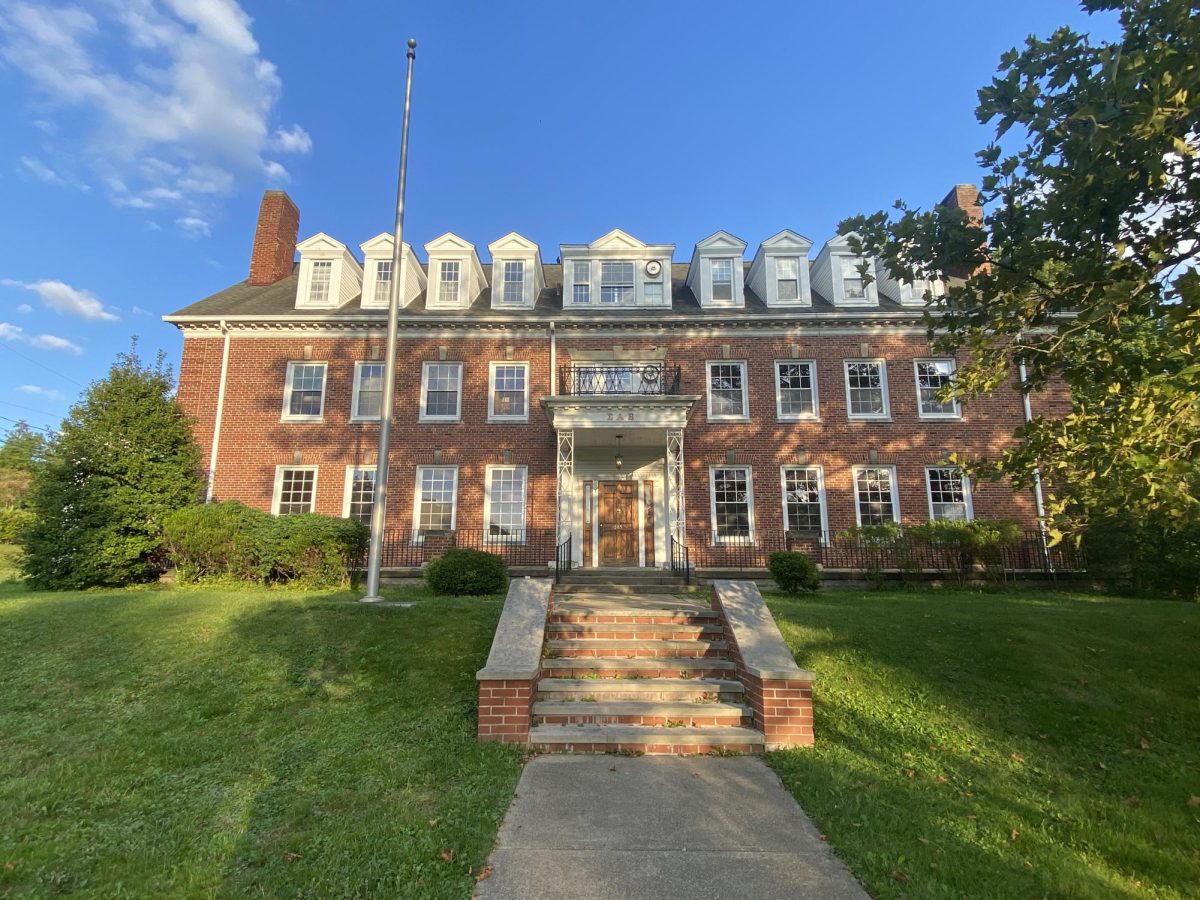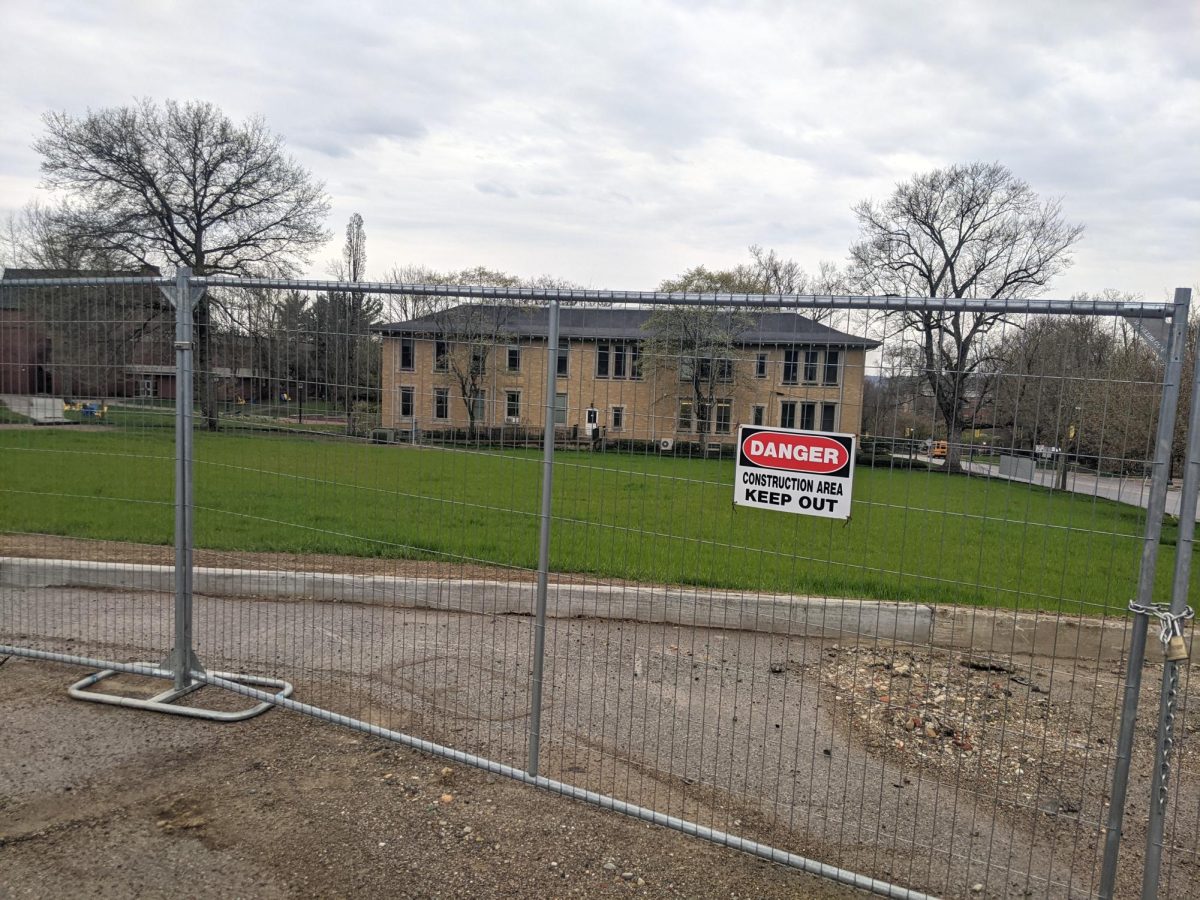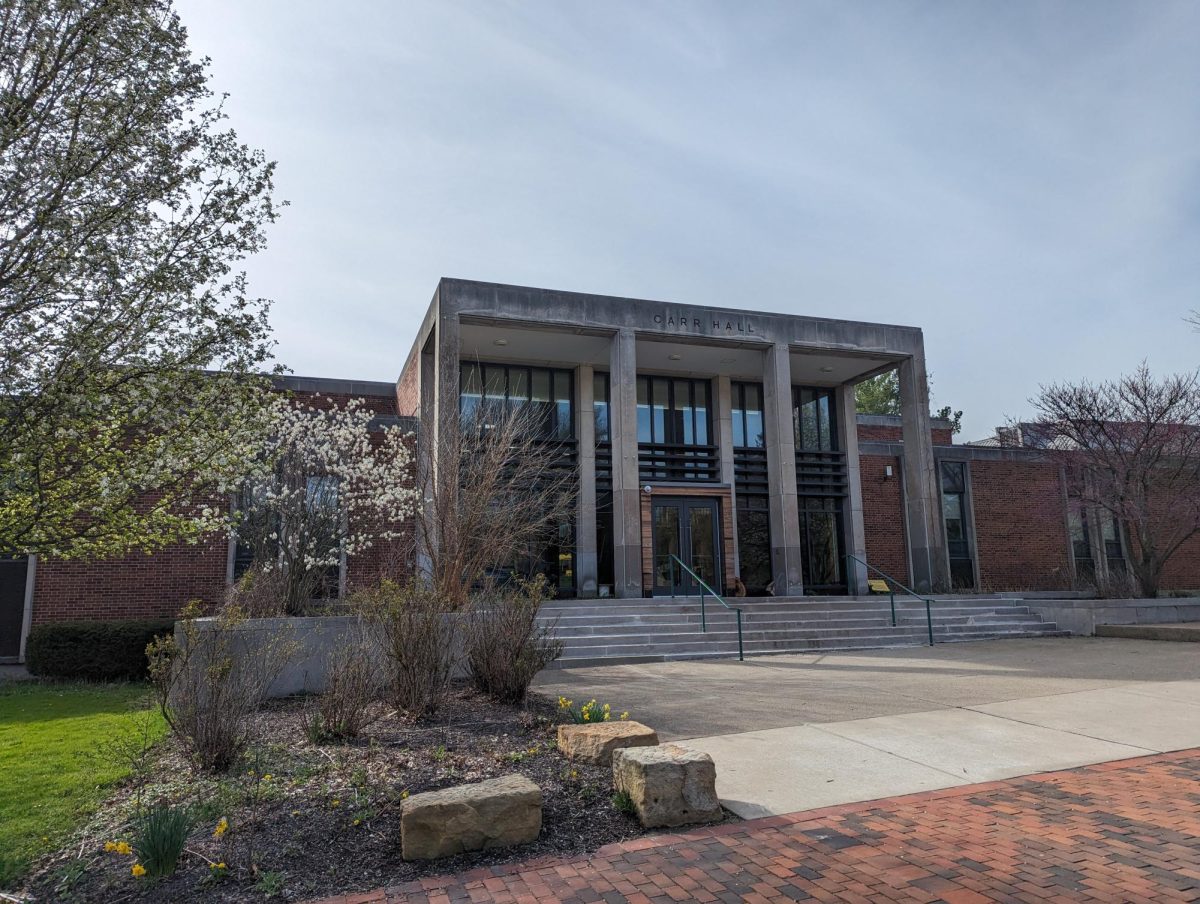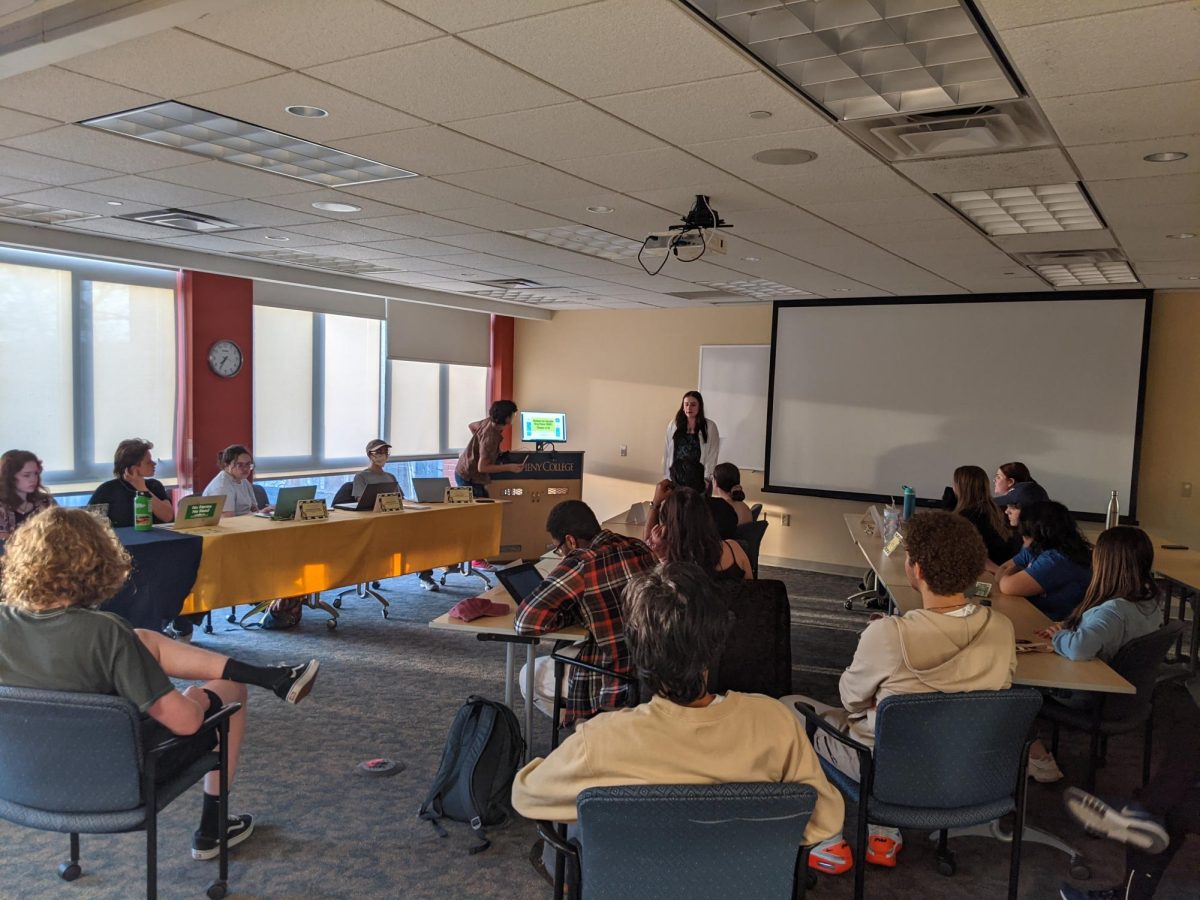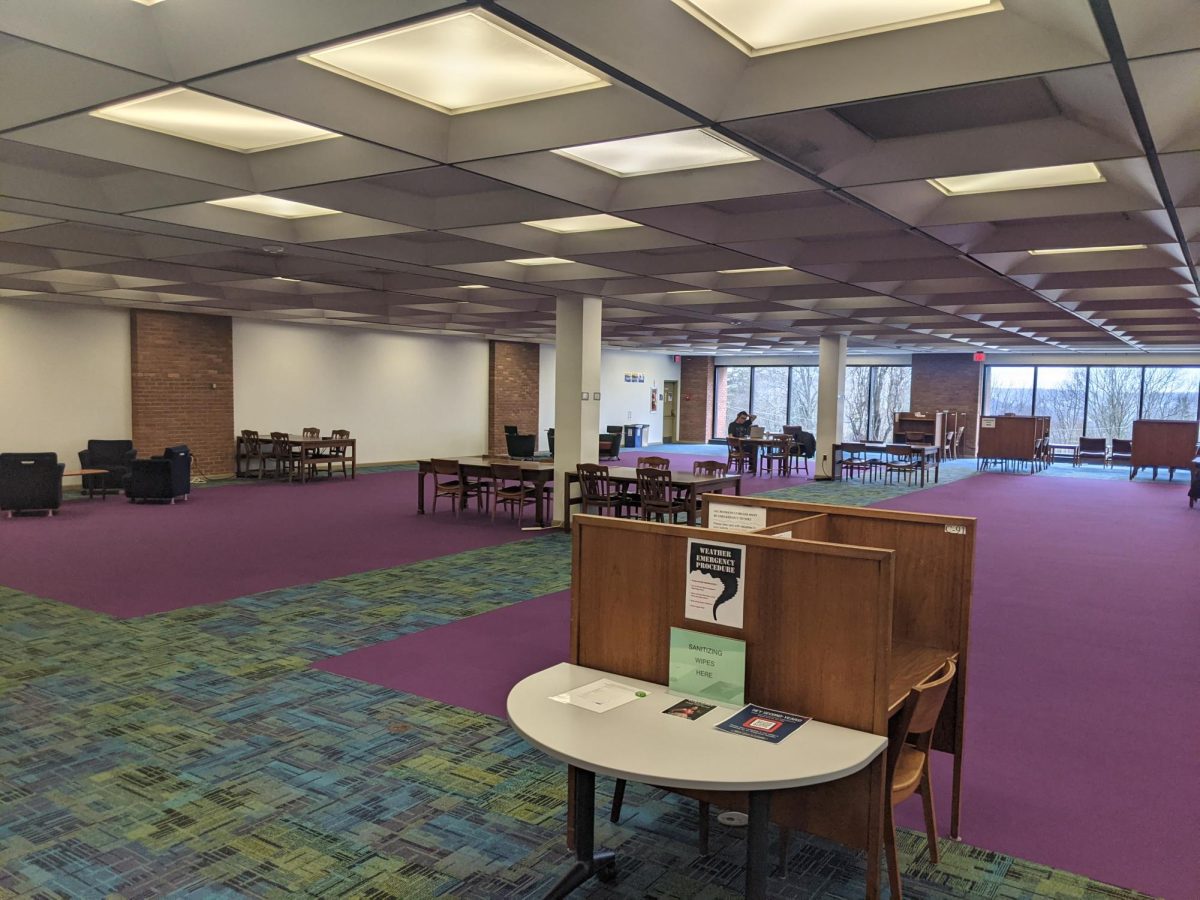Recruiters will be busy on campus this fall, seeking new members for a fraternity that has been absent from campus for nearly 10 years following a raid by federal agents and charges of criminal drug possession against two members.
The Board of Trustees approved Sigma Alpha Epsilon in spring 2021 to return to campus, and in spring 2022, national leadership began delving into the necessary conversations with the college’s Residence Life, according to Assistant Dean for Student Leadership & Engagement Eric Stolar. SAE will reactivate its chapter at the college once they recruit enough members.
Two SAE recruiters tabled during the lunch hour in the lobby of the Henderson Campus Center on Tuesday and Wednesday. They declined to comment on the fraternity’s return to campus and referred The Campus to the national organization. SAE Director of Communications Dave Pascarella did not initially respond to multiple requests for comment. After this story was published on Friday, Pascarella issued a statement to The Campus.
“The Fraternity Service Center of Sigma Alpha Epsilon is enthusiastic about returning to Allegheny College,” the statement read. “SAE is excited to be welcomed back and for the opportunity to recruit men into the chapter who exemplify our beliefs as outlined in our creed, The True Gentleman, and who will also serve as leaders on campus and in the community. Our staff is working with all invested parties, including college officials and local alumni, to ensure the chapter’s long-term success. The goal is to provide a meaningful, safe, and beneficial experience for our members and the greater Allegheny College and Meadville communities.”
In 2013, Meadville police flagged a suspicious package addressed to an SAE member, according to reporting by The Campus. Law enforcement intercepted the package on April 18, 2013 on its way to a house on the 200 block of Prospect Street, according to reporting at the time by The Campus. An affidavit filed by the arresting officer stated that the suspects allegedly ordered a shipment of MDMA, or ecstasy, from British Columbia concealed in a “Titanic” DVD.
Police and agents from the Department of Homeland Security then searched the house owned by the SAE fraternity at 585 North Main Street where the two SAE members resided. Affidavits reported that police found drugs, drug paraphernalia, and money order receipts, The Campus reported at the time.
The two members admitted to ordering the DVD, each pleading guilty to 3 counts of possession of a controlled substance and possession of drug paraphernalia, according to online court records.
Just a few months after the arrest, The Campus reported that the college and the Pennsylvania Omega Alumni House Corporation and Alumni Commission agreed to suspend the chapter until the fall semester of academic year 2016.
In an interview with The Campus on Sept. 1, 2023, Dean for Student Experience Ian Binnington said the Commission voted to suspend the fraternity on their own and that it was not the college’s decision to remove SAE from campus in 2013.
“That was a decision that their organization made,” Binnington said.
In a 2013 statement addressed to undergraduate members of the fraternity, the Commission explained that the organization needed a suspension period to rehabilitate the chapter and prepare for the return of a healthy new group.
“Recurring incidents punctuated by the recent raid of our chapter house by U.S. Homeland Security bring to light deep-seeded problems within the culture of our chapter that cannot simply be fixed with workshops, mentoring or more direct alumni supervision,” the Commission wrote.
A national reputation
Sigma Alpha Epsilon is no stranger to facing sanctions from colleges. At least 10 deaths occurred between 2006 and 2014 in connection with hazing, drugs, or alcohol at Sigma Alpha Epsilon events, according to a 2014 Bloomberg report. SAE has been banned or sanctioned by Yale, Stanford, Chapman, UC Irvine, and University of Oklahoma — among others — for incidents involving sexual harassment, racism, binge drinking, and drug usage. SAE has even earned the moniker ‘Sexual Assault Expected’ at Northwestern University, according to the New York Post. And in 2016, SAE brother Andrew Lohse published a memoir about his rushing and hazing experience and then being a member of the fraternity at Dartmouth College.
“Lured by free booze and friendly brothers, Andrew pledged Sigma Alpha Epsilon, and soon his life became a dangerous cycle of binge drinking and public humiliation,” reads the book’s description on Amazon. “From chugging vinegar to swimming in a pool of human waste, Lohse’s pledge class endured cruelty and psychological coercion in the hopes of obtaining a bid.”
In an interview with The Campus on Sept. 4, Binnington said that while what happened with SAE here at Allegheny was unacceptable, current students should not be held responsible for past students’ mistakes.
“The reality is that pretty much every fraternal organization that dates back to — that dates back over the period that SAE does, and SAE is 150 years old at this point — every fraternal organization has a checkered past,” Binnington said. “It’s not just SAE. That’s not to defend SAE because I’m not going to, but they all have checkered pasts. We can’t make the current students responsible for that past. We can only make current students responsible for their own behavior. And we have made those — we do and we will and we will continue to make current students responsible for their own behavior.”
In 2017, SAE leadership met with members of the Allegheny community to discuss the return of SAE and address any lingering questions or concerns. During that meeting, Deran Abernathy, who works with the fraternity’s alumni engagement, pointed to the fraternity voluntarily closing between 20 and 25 percent of its chapters nationwide in 2014 as an opportunity to reset, The Campus reported at the time.
Abernathy said he “firmly believes” that 95 percent of the fraternity’s members live up to SAE’s organizational goals and that promoting self-policing would help alleviate behavioral issues. Steve Orkis, ’08, who was also present to represent SAE, said the national organization would be “driving home accountability” if it returned to campus.
SAE’s return to campus
Stolar said that the decade-long break is a large feature of why he’s optimistic about the fraternity returning to campus.
“We ended up talking a lot about how one of the reasons they took that whole — at this point, 10 years — to re-group, to re-think is they wanted to make sure — one, they had the supports in place for a new chapter to be coming back to the campus,” Stolar said. “Both through their national headquarters, through networks, through students as well because they wanted to make sure, ‘If we want to come back, we want to do it on the right foot. We wanted not (to) be the same organization that people might remember on Allegheny’s campus.’ So really focusing on turning a new leaf and starting with a fresh start on campus.”
Stolar said he received a more than 100-page document detailing the fraternity’s mission statements, position statements on harassment, human dignity, and the standards they hold the chapter to at this point, as well as information about why they want to be on Allegheny’s campus specifically. The document, Binnington said, is not something “they take off the shelf.” Instead, it’s something they customize for individual institutions, which requires a substantial amount of time and energy.
Those who are spearheading recruiting efforts are professional staff of SAE at a national level, according to Stolar. Because those staff members will have the chance to meet personally with students, Stolar said they will be able to ensure the students are good representatives and align well with SAE’s mission.
In addition to the expectations of national leadership, Stolar feels confident the fraternity brothers will hold themselves to the standards expected of Allegheny students.
“I know our students tend to hold themselves to a high standard and those would be the students going into that organization,” Stolar said. “I do have a lot of faith in our students as well to uphold the Allegheny community and our Statement of Community and the expectations we have for each other on campus and to bring it into that organization as well. And that’s something I would think would help make that organization be successful. They’re still using Allegheny students. It’s the folks we know and love and trust.”
Beyond having faith in students to uphold appropriate standards of conduct, Binnington feels strongly that the national organization will have no patience for misconduct since it reflects poorly on their brand. Sororities and fraternities, he said, understand that when they display their branding everywhere, each individual wearing the brand is responsible for upholding their organization’s reputation.
“We’ve had…exceptionally responsive leadership from the national chapters,” Binnington said. “The national chapters have no patience. No patience whatsoever.”
Panhellenic Council President Meredith Kyser, ’24, said that many of the sorority members she has talked to are nervous about the return of SAE to campus.
“To sum it up, it’s very dangerous and reckless that they’re coming back,” Kyser said.
Kyser learned about SAE’s history at the college last spring, when her sorority spent an entire chapter meeting discussing the topic. She is concerned about pre-existing trends continuing to plague the new chapter.
“It’s very triggering, what they (SAE) did,” Keyser said. “They had a room for sexual assault, which is not great, and drug use, and all that stuff, which I don’t want to promote in any way. At least to the people that I’ve talked to and are close with in Panhel, none of us are happy about this.”
In addition, Kyser is worried that adding another fraternity to campus will negatively affect recruitment rates for existing fraternities.
Binnington and Stolar encouraged students who have reservations or questions about the return of SAE to engage with the recruiters who will be on campus throughout the fall semester.
“There’s nothing to hide here,” Binnington said. “Not from them and not from us.”
SAE will be the last fraternity or sorority to go through the college’s current fraternity and sorority establishment and expansion policy, which requires the Board of Trustees and Residence Life’s approval. Going forward, student-run fraternity and sorority shared governance boards, like the Interfraternity Council and Panhellenic Council, will vote to approve or deny an organization’s application, and Residence Life will then make the final decision. This will give students on campus a more powerful voice and ability to shape their campus community, according to Binnington.
The college bought the former SAE house from the fraternity in early 2023, according to a campus-wide email sent Jan. 12. The building will not be used for residential housing, and while its future is yet to be determined, Binnington hopes it will provide benefit to the entire campus community in some way, shape, or form.
Both Stolar and Binnington are confident that SAE will be a valuable member of the campus community.
“I’m in favor of anything that increases the positivity of the student experience, that increases the sense of belonging that a student has, that helps them find their place, that helps them find their people,” Binnington said. “Fraternities are that for some people. It’s not for everybody, but it is that for some people and those can be very powerful and sometimes life-long bonds.”
This story was updated at 9:05 a.m. on Saturday, Sept. 9 to include a statement from SAE national leadership.



